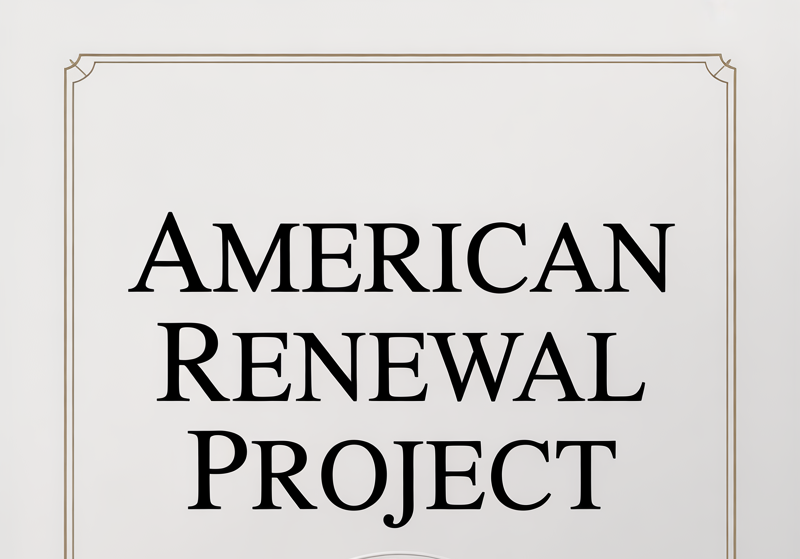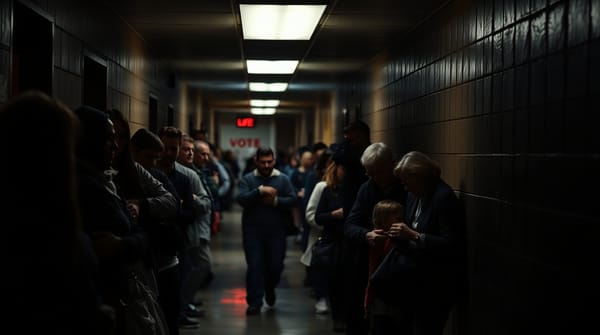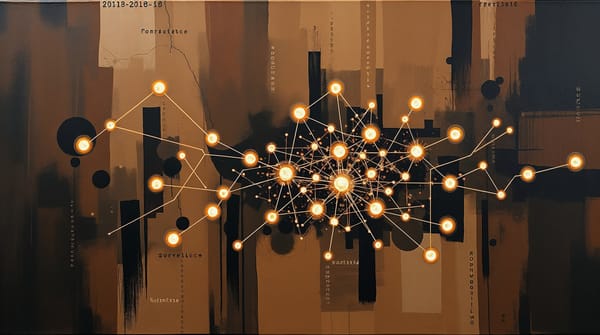The Document We All Ignored
We spent so much time debating whether democracy was in danger that we missed the moment when the danger became operational.

Posted 2:47 AM
I just got off a phone call that's going to keep me awake for the rest of my life.
Three hours ago, my phone rang. Unknown number. I almost didn't answer—I've been getting calls from conspiracy theorists ever since I started covering Blake Morrison's campaign, and frankly, I was exhausted.
The voice on the other end introduced herself as Dr. Patricia Caldwell. Former continuity advisor for the Harrison and Walsh administrations. The name was vaguely familiar—I'd probably seen it in some government directory or quoted in legal briefs about emergency powers.
"I need to talk to someone about the Liberty Research Council document," she said. "The American Renewal Project. You've written about Morrison's policies. I think you need to understand what's actually happening."
I'll be honest—I groaned internally. The Liberty Research Council's 942-page manifesto has been sitting on my desk for months, downloaded but largely unread. Just another think tank doorstop full of conservative policy proposals that would never see daylight. I'd skimmed the executive summary, noted a few inflammatory quotes, and moved on to more immediate stories.
Dr. Caldwell's voice was steady, but there was something underneath it—exhaustion, maybe fear. "Have you actually read Section 12? The part about electoral integrity mapping?"
I hadn't. So she walked me through it, but not before she told me why she was calling.
"They fired my daughter yesterday," she said. "Rebecca. She's a staff attorney at the Commerce Department. Ten years of service, spotless record. They called it 'workforce optimization.' Her supervisor told her off the record that her mother's 'recent statements' had raised questions about family loyalty."
Rebecca Caldwell had never made any political statements. Her only crime was being Dr. Caldwell's daughter.
"My pension review is next week," Dr. Caldwell continued. "Thirty-two years of federal service, and they're suddenly finding 'irregularities' in my consulting contracts from 2018. Irregularities that didn't exist when they approved those contracts eight years ago."
The message was clear: shut up, or lose everything.
But Dr. Caldwell kept talking. She explained that what the Liberty Research Council had published wasn't a theoretical policy discussion. It was an operational manual for suspending elections using emergency continuity procedures—procedures she had helped design during the Walsh administration as legitimate safeguards against genuine national crises.
"They've turned our own legal framework into a weapon," she said. "Emergency powers I helped draft to protect democracy during real emergencies. Now they're manufacturing crises to justify using them."
Her security clearance was already gone—a routine renewal that suddenly became a "complex review requiring additional investigation." Her husband, a career State Department employee, had been reassigned from his senior diplomatic post to a basement office reviewing trade documents. Their son, a junior officer in the Navy, was passed over for promotion despite exemplary service records.
"They don't need to arrest dissidents anymore," she told me. "They just destroy your family's ability to make a living. Much more efficient."
She'd watched three of her former colleagues lose their jobs in the past month after raising questions about the Continuity Test memo. Dr. Allen Voss, former NSA legal counsel who questioned the surveillance provisions, had his consulting firm's government contracts canceled. No reason given. Margaret Torres, a twenty-year veteran of the Justice Department who raised concerns about the voter verification protocols, was transferred to a field office in rural Idaho despite having school-age children in DC. David Kumar, a career Defense Department analyst who wrote a memo questioning the constitutionality of the emergency powers framework, was placed on administrative leave pending an investigation into his "handling of classified materials"—materials he'd been authorized to review for fifteen years.
"I'm calling you because I'm probably the last person willing to go on record about what the document actually means," she said. "Everyone else with insider knowledge has already been neutralized. And after tonight, I probably won't be able to either."
After we hung up, I pulled up the document. Really read it this time. Section 12.4.3 describes "temporary electoral suspensions during constitutional emergencies." The legal justifications. The procedural steps. The federal agencies that would need to coordinate.
Then I started checking news reports from the past six months. Morrison's rhetoric about "election security threats." The mysterious Justice Department memos about "foreign interference protocols." The joint exercises between Homeland Security and state election boards that were described as "routine preparedness drills."
The training exercises weren't preparation for hypothetical emergencies. They were dress rehearsals for the actual implementation.
The Liberty Research Council didn't just publish a policy wishlist. They published an instruction manual. And while journalists like me were focused on Maxwell's latest inflammatory tweet or campaign rally controversy, his administration was quietly implementing the roadmap for a constitutional coup.
Page 247 outlines "citizenship verification protocols" that could strip voting rights from millions of Americans. I cross-referenced this with recent voter roll purges in Wisconsin, Arizona, and Georgia. The methodologies match exactly.
Page 324 describes "information environment management"—licensing requirements for news organizations that could shut down independent journalism. Last week, the FCC announced new "media accountability standards" for broadcast licenses. The language is nearly identical.
Page 156 details "economic realignment through federal contract prioritization." Yesterday, three major defense contractors announced they were consolidating operations under a single holding company. The holding company is owned by Emerson Rake.
The pattern is too precise to be accidental. The document isn't a policy wishlist—it's an implementation schedule that's already being followed
The most chilling part isn't the authoritarianism—it's how legal it all is. Everything described in the document works within existing constitutional frameworks. They're not breaking laws. They're exploiting the gaps between what's legal and what's democratic.
Emergency powers designed to protect democracy during genuine crises can be weaponized against democracy during manufactured ones. Voter verification systems designed to prevent fraud can be configured to prevent voting. Media regulation designed to ensure accountability can be twisted into censorship.
Dr. Caldwell understood she was probably sacrificing her family's future to warn me. But she'd reached the point where staying quiet felt like complicity.
"I'm 67 years old," she had said. "I can survive this. But I can't survive knowing I stayed quiet while they used my work to dismantle the American Experiment."
This morning, I tried calling her back to verify a few details. The number had been disconnected. Her Georgetown University office voicemail says she's "on indefinite administrative leave." Her government email bounces back with a "recipient unknown" error.
Dr. Patricia Caldwell—thirty-two years of federal service, impeccable record, security clearance holder, constitutional law expert—has been erased from the system as efficiently as deleting a file.
I've been covering politics for over a decade. I thought I understood how the system worked. I thought our democratic institutions were stronger than any individual politician or party. I thought the checks and balances were real safeguards, not just procedural suggestions.
Dr. Caldwell helped me understand something I should have recognized months ago: those safeguards only work when everyone agrees to respect them. When someone decides the rules are optional, the entire system becomes optional.
The Liberty Research Council document wasn't published as a hypothetical exercise. It was published as a blueprint. And while we were all arguing about whether democracy was in danger, they were busy following the blueprint to dismantle it.
The Liberty Research Council document has been publicly available for months. Join the network for a download link to the executive summary and my annotations.
Look at my notes. Then look at what's happening in your state. The patterns are there if you know what to look for.
We spent so much time debating whether democracy was in danger that we missed the moment when the danger became operational.
[Comments disabled]
Important Notice
The American Autocracy Universe is a work of fiction created for educational and entertainment purposes. All organizations, characters, policies, and events described are entirely fictional and do not represent any real government agency, political organization, or individuals.
Any resemblance to actual government documents, policy proposals, or political strategies is purely coincidental and intended to illustrate historical patterns of authoritarian governance for educational purposes.
This content is protected speech under the First Amendment and is not intended to promote, encourage, or provide instruction for any illegal activities.
About the Creator
Greg Wolford is the creator of The American Autocracy Universe. This multimedia storytelling project spans blogs, podcasts, newsletters, and fiction to explore themes of resistance, documentation, and hope in the face of systematic oppression.
© 2025 Greg Wolford. Truth survives.
"Democracy dies in darkness. But it also dies in plain sight, when people stop paying attention."




